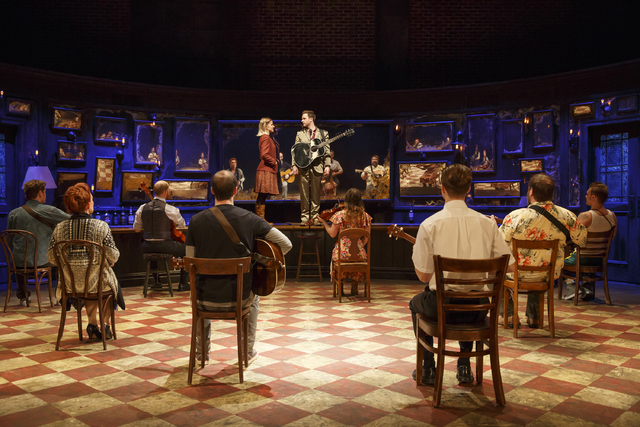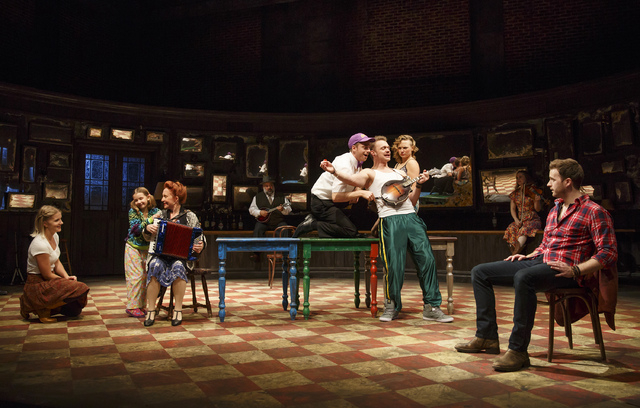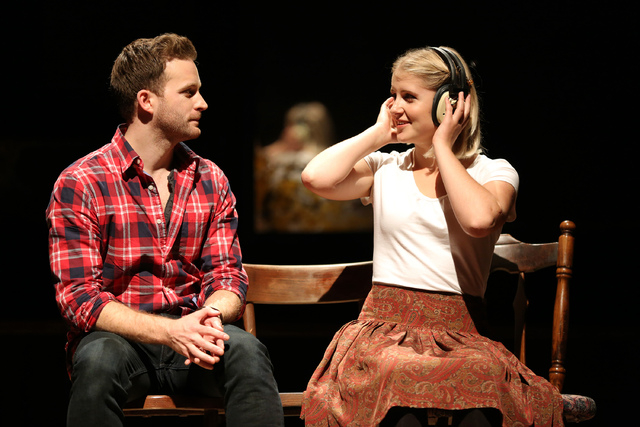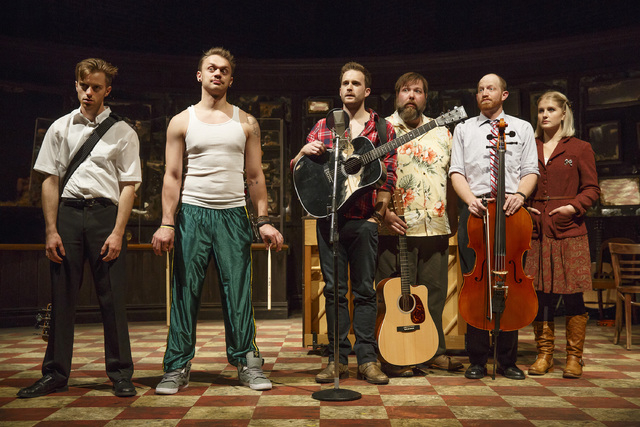Tony-winning ‘Once’ has song and dance, just not as you expect




Gotta sing, gotta dance.
Like all musicals, “Once” does. Just not in the ways you expect.
The Tony-winning show opens an eight-performance run Tuesday in The Smith Center’s Reynolds Hall.
“Once,” based on the 2006 movie of the same name, does have songs — including the Oscar-winning “Falling Slowly” — and dances, albeit in more stylized fashion than more traditional kick-up-your-heels shows.
Even its creators and cast members acknowledge that “Once” doesn’t exactly fit the splashy Broadway stereotype.
“We’re not a big, flash-bang, wallopy” musical, says Martin Lowe, the show’s music supervisor, who won a Tony for his orchestrations, one of eight Tonys captured by the “tiny, intimate show.” (Including best musical.)
“In another life, we would never have” wound up on Broadway at all, Lowe says in a telephone interview. “But we just touched a nerve.”
Then again, the nerve “Once” touches is one everybody has, leading lady Dani de Waal says.
“It’s kind of a simple story — a modern-day love story, if you like,” de Waal says in a telephone interview from the show’s Denver tour stop.
Unlike many conventional musicals, “Once” doesn’t necessarily have a happily-ever-after ending — and “people really relate to that,” she says.
And while it covers big universal themes, among them love and loss, the focus remains on the characters experiencing those universal emotions, she adds. “It’s different. And kind of refreshing.”
For one thing, the characters de Waal and leading man Stuart Ward play have no names. He’s “Guy” (OK, that could be a name) but she’s “Girl.”
The two meet in a Dublin bar, where Guy’s singing his heart out, mourning a lost love. This is his farewell performance — or so he thinks.
He’s giving up on music because the memories it stirs are too painful, resigning himself to a life of repairing vacuum cleaners in his father’s shop.
But Girl, a Czech immigrant with a vacuum that, literally, “does not suck,” offers to play piano for him in exchange for said vacuum’s repair, triggering a meeting of musical minds, and hearts, that changes them both.
Irish playwright Enda Walsh adapted writer-director John Carney’s screenplay for the stage, providing a new framework for Glen Hansard and Marketa Irglova’s music.
While “Once” has a musical score, however, there’s no orchestra on hand to play it.
Instead, the performers provide their own accompaniment, playing instruments from cello to ukulele.
“It’s a guitar-led show with a bit of piano,” explains Lowe, noting that “most of the guys” in the cast “have to play guitar at some point,” with some chiming on mandolin and ukulele, too. Two actresses play violin; another actor plays cello. There’s also a bassist and a drummer. (To say nothing of seven understudies waiting offstage, prepared to take over if need be.)
Yet there’s no conductor to lead them.
“When I started rehearsals, it was a totally new experience,” de Waal says. “Playing an instrument, with no conductor, we’re listening to each other all the time.”
At first, playing the piano — onstage and in character — was “definitely the part I was most nervous about,” she says of her role. And “as much as you want to stay in character,” at the start of the tour de Waal found herself slipping out of character before she went on, muttering to herself, “Don’t mess up, don’t mess up.”
With time and practice, however, “it’s a big part of the character,” she says of her piano playing, which adds another layer to the storytelling.
“Now, I can’t imagine playing the role without it.”
Finding actors who sang and played instruments equally well proved a bit of a casting nightmare for Lowe and his colleagues: Tony-winning director John Tiffany (up for another Tony this year for his direction of the current “Glass Menagerie” revival) and choreographer Steven Hoggett.
“There are only a few people onstage in ‘Once,’ so you can’t hide,” Lowe says. “If you can’t play the piano or the guitar or the violin, there’s nothing we can do with you. Similarly, Enda’s text is really difficult to do, so you’ve got to be a good actor. And Steve’s choreography looks easy, but it’s very skillful.”
Lowe says his approach to the score came from the movie and the movie soundtrack, which he describes as “the reference point” for audiences. But he says, “the trick was to scale it up without making it vulgar or brash or too Broadway.”
Fortunately, “within the world of ‘Once,’ there’s quite a lot of flexibility,” he adds, noting that the show’s creators empower the cast to determine which instruments they want to play during the show, making the London, Broadway and touring versions all slightly different.
But there’s one thing all “Once” companies share: a 20-minute preshow in which the cast members (except for de Waal and Wilson) gather for a jam session featuring Irish and Czech folk songs.
So get there early to listen — and, if you’ve a mind, to go onstage yourself and order a pint from the working bar that’s part of Bob Crowley’s Tony-winning set design.
The preshow “sets up a family kind of vibe with the audience and takes them over to Ireland,” as de Waal describes it, making for a familiarity because audience members have been up close and personal with the cast.
“It’s all part of the experience,” de Waal says.
And that seems entirely appropriate, considering music’s central role in the overall impact of “Once.”
“The music itself is a huge, driving force in the piece,” de Waal says. “Everyone has a relationship to music whether they can articulate it or not. It’s a universal art form.”
It’s one that suits “Once,” because “it’s a most universal story. It’s about how music can heal people and heal situations — and just about everybody can relate to that.”
Contact reporter Carol Cling at ccling@reviewjournal.com or 702-383-0272.
Preview
“Once”
7:30 p.m. Tuesday-Thursday; also 7:30 p.m. May 23, 2 and 7:30 p.m. May 24-25
Reynolds Hall, The Smith Center for the Performing Arts, 361 Symphony Park Ave.
$26-$129 (702-749-2000, www.thesmithcenter.com)


















